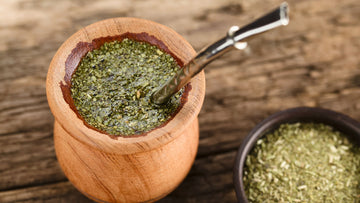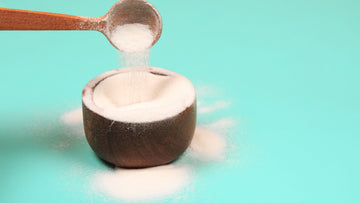
Yerba mate, a traditional South American beverage, has gained popularity worldwide, often marketed as a healthier alternative to coffee. While many people are drawn to its unique flavor and purported health benefits, it’s crucial to understand that yerba mate contains caffeine and can be just as addictive as coffee. This article explores the caffeine content in yerba mate, its addictive potential, and why it may not be a suitable alternative for those looking to give up coffee.
What is Yerba Mate?
Yerba mate is made from the dried leaves of the Ilex paraguariensis plant, native to regions of South America, particularly Argentina, Brazil, and Paraguay. Traditionally consumed from a gourd using a metal straw (bombilla), yerba mate is steeped in hot water, producing a distinctive herbal flavor.
Caffeine Content in Yerba Mate
Caffeine is a central nervous system stimulant that can lead to increased alertness and improved mood. Yerba mate contains caffeine, typically ranging from 30 to 85 mg per 8-ounce serving, depending on the strength and preparation method. This caffeine content is comparable to that of coffee, which averages between 95 to 200 mg per 8-ounce serving.
Despite being lower in caffeine than coffee, many people consume larger quantities of yerba mate in a single sitting, often drinking multiple servings throughout the day. This increased consumption can elevate caffeine intake significantly, leading to similar dependency and withdrawal effects as those experienced with coffee.
Yerba Mate's Addictive Nature
The stimulating effects of yerba mate are due to its caffeine content, which, like coffee, can lead to a cycle of dependency. Regular consumption can create tolerance, meaning individuals may need to consume larger amounts to achieve the same stimulating effects over time.
Why is Yerba Mate Addictive?
-
Chemical Effects: Yerba mate not only contains caffeine but also theobromine, another stimulant found in chocolate. The combined effects of these compounds can enhance mood and energy levels, reinforcing the desire to consume more.
-
Social Ritual: Drinking yerba mate often involves social interaction, as it’s commonly shared among friends and family in South America. This communal aspect can deepen psychological dependency, making it difficult for individuals to break away from the habit.
-
Cultural Norms: For many, yerba mate is a traditional beverage consumed throughout the day. Its integration into daily life can create a sense of routine that becomes hard to break.
Withdrawal Symptoms
When individuals who regularly consume yerba mate decide to cut back or eliminate it from their diets, they may experience withdrawal symptoms similar to those associated with coffee. Common symptoms include:
- Headaches: Often caused by changes in blood flow and the absence of caffeine.
- Fatigue: A sudden drop in energy levels, leading to feelings of tiredness and lethargy.
- Irritability: Mood swings and increased irritability are common during withdrawal.
- Difficulty Concentrating: A decrease in focus and cognitive function can occur without the stimulant effects of caffeine.
- Nausea and Flu-like Symptoms: Some individuals may experience gastrointestinal discomfort, including nausea or muscle aches.
The withdrawal timeline for yerba mate can mirror that of coffee, with symptoms typically beginning within 12 to 24 hours after the last intake and lasting several days.
Misconceptions About Yerba Mate as a Coffee Alternative
Many people turn to yerba mate as a perceived healthier alternative to coffee. However, this misconception can be misleading for those seeking to eliminate caffeine from their diets.
The Reality of Caffeine in Yerba Mate
-
Caffeine Content: As previously mentioned, yerba mate contains a significant amount of caffeine. For those looking to eliminate caffeine entirely, consuming yerba mate still contributes to their overall intake and can perpetuate caffeine dependency.
-
Perception of Health Benefits: While yerba mate is rich in antioxidants and certain vitamins, these health benefits do not negate its caffeine content or potential for addiction. Relying on yerba mate as a "healthier" alternative may simply replace one dependency with another.
-
Potential for Overconsumption: Because yerba mate is often consumed in larger quantities than coffee, individuals may inadvertently increase their caffeine intake while attempting to switch beverages. This can lead to heightened anxiety, sleep disturbances, and other negative health effects associated with excessive caffeine consumption.
Health Implications of Yerba Mate Consumption
Although yerba mate is often praised for its health benefits, there are potential health implications associated with its caffeine content:
-
Increased Anxiety: For those sensitive to caffeine, yerba mate can exacerbate feelings of anxiety and nervousness, similar to what can occur with coffee consumption.
-
Sleep Disruptions: Consuming yerba mate, especially later in the day, can interfere with sleep patterns, leading to insomnia or poor sleep quality.
-
Digestive Issues: Some individuals may experience gastrointestinal discomfort from consuming yerba mate, particularly if consumed in excess.
-
Heart Health: High caffeine intake can elevate heart rate and blood pressure in some individuals, which may pose risks for those with underlying heart conditions.
Breaking Free from Caffeine Dependency
If you are looking to eliminate caffeine dependency, it’s essential to recognize that yerba mate, while often viewed as a gentle alternative, still contains significant amounts of caffeine. Here are steps to help break free from caffeine dependency:
-
Gradual Reduction: Instead of quitting yerba mate cold turkey, gradually reduce your intake to help minimize withdrawal symptoms.
-
Explore Truly Caffeine-Free Options: Consider herbal teas or other beverages that do not contain caffeine at all. Many herbal options offer a variety of flavors without the stimulating effects of caffeine.
-
Stay Hydrated: Drinking plenty of water can help alleviate withdrawal symptoms and keep your body hydrated during the transition.
-
Prioritize Rest: Ensure you get enough sleep and allow your body to adjust without caffeine. Establishing a calming nighttime routine can also aid in improving sleep quality.
Conclusion
While yerba mate is often marketed as a healthier alternative to coffee, it is essential to understand that it contains caffeine and can be just as addictive. For those seeking to eliminate caffeine from their lives, switching to yerba mate may not be the solution they hope for, as it can perpetuate the cycle of dependency and withdrawal.
By recognizing the caffeine content in yerba mate and understanding its potential effects on health, individuals can make informed choices about their beverage consumption. Ultimately, if you're looking to break free from caffeine dependency, it's crucial to eliminate all sources of caffeine, including yerba mate, to achieve a truly caffeine-free lifestyle.





